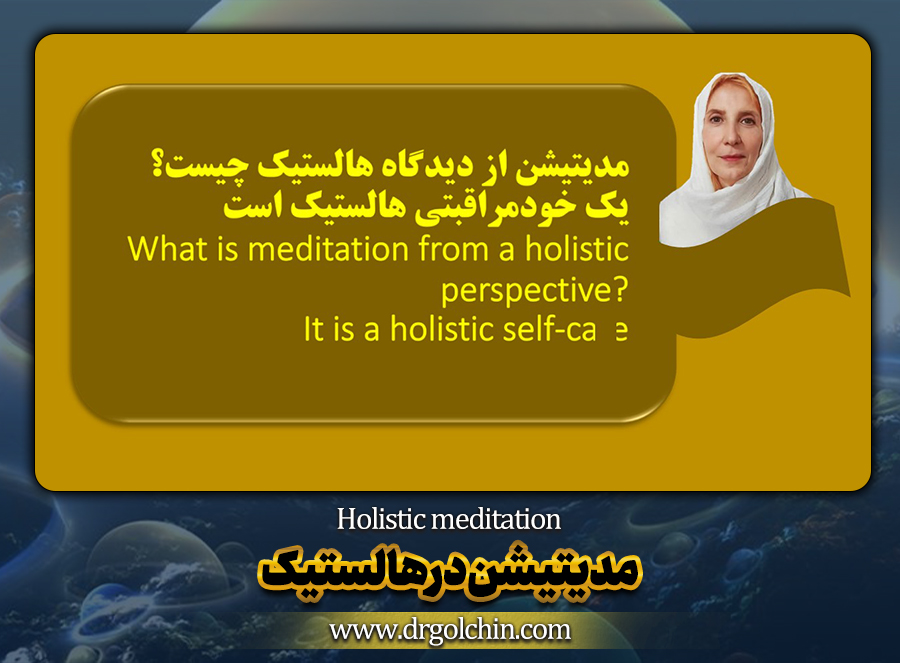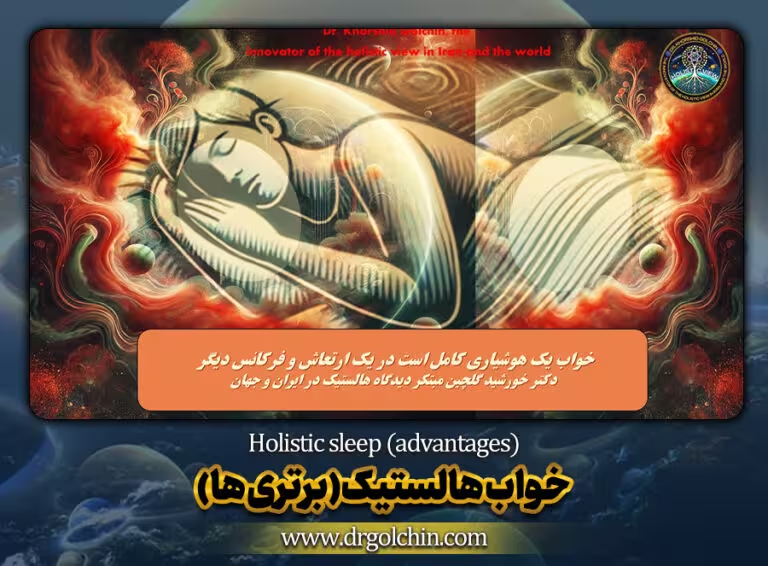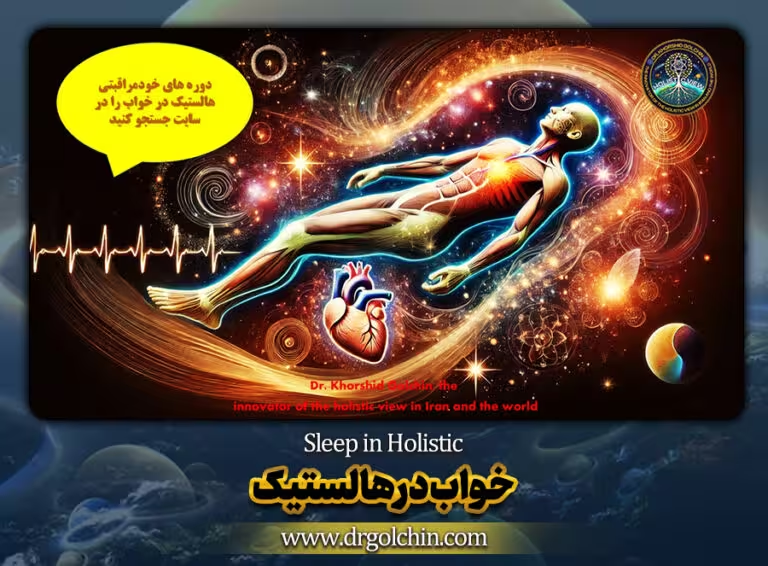مدیتیشن در هالستیک

مدیتیشن یکی از موثرترین روشها برای کاهش استرس است. این روش به دلایل مختلف از جمله ایجاد آرامش ذهنی، کاهش تنشهای بدنی و بهبود آگاهی فرد از خود، به کاهش استرس کمک میکند. در ادامه توضیح میدهم که چگونه مدیتیشن به کاهش استرس کمک میکند. در ادامه با مقاله مدیتیشن در هالستیک همراه باشید :
فهرست عناوین
- آرامش ذهنی و کاهش افکار مزاحم
- کاهش فعالیت سیستم عصبی سمپاتیک
- تنفس عمیق و کاهش تنش بدنی
- افزایش آگاهی از بدن و احساسات
- کاهش ترشح هورمونهای استرس
- بهبود کیفیت خواب در مدیتیشن در هالستیک
- تقویت مهارتهای مدیریت استرس
- افزایش همدلی و مهربانی با خود
- کنترل بهتر بر واکنشهای عاطفی
- آیا مدیتیشن برای همه مناسب است ؟
- مزایای عمومی مدیتیشن برای بسیاری از افراد
- موانع یا چالشها برای برخی افراد
- صبر و تمرین مداوم نیاز است
- مدیتیشنهای متنوع برای افراد مختلف در مدیتیشن در هالستیک
- افرادی که به راهنمایی و نظارت نیاز دارند
- شرایط جسمانی خاص در مقاله مدیتیشن در هالستیک
- نتیجهگیری مقاله مدیتیشن در هالستیک
آرامش ذهنی و کاهش افکار مزاحم
- تأثیر: مدیتیشن به افراد کمک میکند که تمرکز خود را از افکار پراکنده و نگرانیهای ذهنی به یک موضوع خاص (مثل تنفس یا بدن) منتقل کنند. با تمرکز بر لحظه حال، افکار مزاحم که عامل اصلی استرس هستند، به طور موقت کنار گذاشته میشوند. این به ذهن فرصتی میدهد تا استراحت کرده و از چرخهی افکار اضطرابآور خارج شود.(مدیتیشن در هالستیک)
کاهش فعالیت سیستم عصبی سمپاتیک
- تأثیر: استرس معمولاً فعالیت سیستم عصبی سمپاتیک را فعال میکند که باعث واکنش “جنگ یا گریز” در بدن میشود (افزایش ضربان قلب، تنش عضلات، و ترشح هورمونهای استرس مانند کورتیزول). مدیتیشن به کاهش فعالیت سیستم عصبی سمپاتیک و افزایش فعالیت سیستم پاراسمپاتیک کمک میکند که بدن را به حالت آرامش و ترمیم بازمیگرداند. (مدیتیشن در هالستیک)
تنفس عمیق و کاهش تنش بدنی
- تأثیر: در مدیتیشن تنفس عمیق، فرد به آرامی نفس میکشد و این تنفسهای عمیق به کاهش ضربان قلب، کاهش فشار خون، و کاهش تنشهای فیزیکی کمک میکند. این فرآیند باعث ایجاد حالت آرامش در بدن شده و به کاهش استرس منجر میشود.
افزایش آگاهی از بدن و احساسات
- تأثیر: مدیتیشنهای مبتنی بر ذهن آگاهی (مانند مدیتیشن اسکن بدن) به افراد کمک میکنند تا با بدن و احساسات خود بیشتر آشنا شوند و تنشها و استرسهای جسمی و عاطفی را بهتر شناسایی کنند. این آگاهی باعث میشود که فرد بتواند به موقع واکنش نشان دهد و از انباشته شدن استرس جلوگیری کند.(مدیتیشن در هالستیک)
کاهش ترشح هورمونهای استرس
- تأثیر: مطالعات نشان دادهاند که مدیتیشن میتواند به کاهش سطح کورتیزول، هورمون استرس، در بدن کمک کند. با کاهش سطح این هورمون، فرد کمتر دچار احساس اضطراب و فشار روانی میشود.
بهبود کیفیت خواب در مدیتیشن در هالستیک
- تأثیر: استرس و اضطراب معمولاً منجر به مشکلات خواب میشود. مدیتیشن به افراد کمک میکند تا آرامش بیشتری پیدا کنند و بهبود کیفیت خواب خود را تجربه کنند. خواب بهتر به نوبه خود باعث کاهش سطح استرس در طول روز میشود.
تقویت مهارتهای مدیریت استرس
- تأثیر: مدیتیشن به افراد کمک میکند تا مهارتهای بیشتری برای مدیریت استرس در موقعیتهای چالشبرانگیز پیدا کنند. با تمرین منظم، فرد میآموزد که چگونه در لحظات پرتنش به آرامی نفس بکشد، تمرکز کند و استرس خود را کنترل کند.
افزایش همدلی و مهربانی با خود
- تأثیر: مدیتیشن محبت و مهربانی (Loving-Kindness Meditation) به افراد کمک میکند که نسبت به خود و دیگران احساس همدلی و محبت بیشتری داشته باشند. این رویکرد باعث کاهش خودسرزنشی و استرسهای عاطفی میشود.
کنترل بهتر بر واکنشهای عاطفی
- تأثیر: مدیتیشن به تقویت توانایی فرد در مشاهده افکار و احساسات خود بدون قضاوت کمک میکند. این مهارت باعث میشود که فرد بتواند بهتر با احساسات منفی و استرسهای روزمره برخورد کند و واکنشهای خود را کنترل کند.
مدیتیشن از طریق ایجاد آرامش ذهنی، کاهش فعالیتهای فیزیکی ناشی از استرس، و تقویت آگاهی از بدن و احساسات، به کاهش استرس کمک میکند. با تمرین منظم، افراد میتوانند بهتر با موقعیتهای پرتنش روبرو شده و به طور کلی زندگی آرامتری تجربه کنند. (مدیتیشن در هالستیک)

آیا مدیتیشن برای همه مناسب است ؟
مدیتیشن برای بسیاری از افراد میتواند مفید و مناسب باشد، اما مثل هر روش دیگری، برای همه به یک شکل جواب نمیدهد. به طور کلی، مدیتیشن فواید زیادی مانند کاهش استرس، افزایش تمرکز و تقویت آرامش دارد، اما شرایط و نیازهای افراد میتواند تعیینکننده باشد که آیا این روش برای آنها مناسب است یا نه. در زیر به نکاتی درباره مناسب بودن مدیتیشن برای افراد مختلف اشاره میکنم:
مزایای عمومی مدیتیشن برای بسیاری از افراد
- کاهش استرس و اضطراب: بسیاری از افراد، چه در دنیای مدرن و پر از استرس و چه در شرایط چالشبرانگیز، از فواید مدیتیشن برای کاهش استرس و اضطراب بهره میبرند.
- افزایش تمرکز و آرامش: مدیتیشن میتواند تمرکز ذهنی و توانایی مدیریت افکار پراکنده را تقویت کند، که برای اکثر افراد مفید است.
- بهبود خواب: مدیتیشن میتواند به بهبود کیفیت خواب کمک کند و برای افرادی که با مشکلات خواب روبرو هستند، سودمند باشد.
موانع یا چالشها برای برخی افراد
- شرایط روانشناختی خاص: افرادی که از مشکلات روانی جدی مثل اختلال استرس پس از سانحه (PTSD)، افسردگی شدید، یا اضطراب شدید رنج میبرند، ممکن است نیاز به مدیتیشنهای خاص یا تحت نظارت متخصص داشته باشند. در برخی موارد، مدیتیشن ممکن است باعث تحریک احساسات شدید شود که نیاز به مدیریت دقیق دارد.
- اختلالات روانی شدید: برای افرادی که دچار اختلالات روانی شدید هستند، مثل اختلالات روانپریشی یا اسکیزوفرنی، مدیتیشن ممکن است منجر به تشدید علائم شود. در این موارد، مشورت با یک متخصص روانشناس یا روانپزشک ضروری است.(مدیتیشن در هالستیک)
صبر و تمرین مداوم نیاز است
- نیاز به صبر و تمرین مداوم: مدیتیشن برای بسیاری از افراد ابتدا ممکن است دشوار یا بیفایده به نظر برسد، زیرا اثرات آن به مرور زمان و با تمرین منظم آشکار میشود. برخی افراد که به دنبال نتایج سریع هستند، ممکن است از مدیتیشن ناامید شوند و نیاز به صبر بیشتری داشته باشند.(مدیتیشن در هالستیک)

مدیتیشنهای متنوع برای افراد مختلف در مدیتیشن در هالستیک
- انتخاب سبک مناسب: مدیتیشن سبکهای مختلفی دارد، از جمله مدیتیشن تنفس، مدیتیشن راه رفتن، مدیتیشن هدایت شده، و مدیتیشن ذهنآگاهی. افراد باید سبکهایی را که با نیازها و شخصیتشان همخوانی دارد، پیدا کنند. برای برخی، مدیتیشن فعال مثل مدیتیشن راه رفتن میتواند مناسبتر از مدیتیشن نشسته باشد.
- مدت زمان مدیتیشن: برخی افراد ممکن است با جلسات طولانی مدیتیشن راحت نباشند. در این موارد، شروع با جلسات کوتاهتر و سپس افزایش تدریجی مدت زمان میتواند موثر باشد.
افرادی که به راهنمایی و نظارت نیاز دارند
- نیاز به راهنمایی: برخی افراد، به ویژه کسانی که در ابتدای راه هستند، ممکن است نیاز به راهنمایی داشته باشند تا تمرینهای مدیتیشن را به درستی انجام دهند. استفاده از مربیان مدیتیشن یا برنامههای هدایت شده میتواند در این موارد مفید باشد.
شرایط جسمانی خاص در مقاله مدیتیشن در هالستیک
- مشکلات جسمانی: افرادی که مشکلات جسمی خاصی دارند ممکن است نتوانند به راحتی در حالتهای سنتی مدیتیشن مثل نشستن طولانیمدت قرار بگیرند. در این موارد، استفاده از پوزیشنهای جایگزین یا مدیتیشنهای فعالتر مانند مدیتیشن راه رفتن میتواند گزینههای بهتری باشند.
نتیجهگیری مقاله مدیتیشن در هالستیک
در حالی که مدیتیشن برای بسیاری از افراد مفید است، این روش برای همه به یک اندازه مناسب نیست. افرادی که با مشکلات روانی شدید یا مشکلات جسمانی خاص روبرو هستند، باید با مشورت یک متخصص شروع کنند. با این حال، با وجود سبکهای متنوع و تمرین منظم، اکثر افراد میتوانند نوعی از مدیتیشن را پیدا کنند که به نیازهایشان پاسخ دهد.
Meditation is one of the most effective methods for reducing stress. It helps create mental relaxation, reduce physical tension, and improve self-awareness. Here’s how meditation helps reduce stress:
- Mental Relaxation and Reducing Intrusive Thoughts
- Effect: Meditation helps individuals shift their focus away from scattered thoughts and worries, directing it to a specific object (like breathing or the body). By focusing on the present moment, distracting thoughts, which are the primary cause of stress, are temporarily set aside. This gives the mind a chance to rest and break free from the cycle of anxious thinking.
- Reduction in Sympathetic Nervous System Activity
- Effect: Stress typically activates the sympathetic nervous system, triggering the “fight or flight” response (increased heart rate, muscle tension, and the release of stress hormones like cortisol). Meditation reduces the activity of the sympathetic nervous system and increases the activity of the parasympathetic nervous system, which promotes relaxation and healing in the body.
- Deep Breathing and Physical Relaxation
- Effect: In deep breathing meditation, the individual breathes slowly and deeply, which helps reduce heart rate, lower blood pressure, and relieve physical tension. This process induces a state of relaxation in the body, leading to reduced stress.
- Increased Awareness of the Body and Emotions
- Effect: Mindfulness-based meditation (such as body scan meditation) helps individuals become more aware of their bodies and emotions, making it easier to recognize physical and emotional stress. This awareness allows individuals to respond appropriately and prevent stress from accumulating.
- Reduction in Stress Hormone Production
- Effect: Studies have shown that meditation can lower cortisol levels, the stress hormone, in the body. Lower cortisol levels reduce feelings of anxiety and psychological pressure.
- Improved Sleep Quality
- Effect: Stress and anxiety often lead to sleep problems. Meditation helps individuals relax and improve their sleep quality, which, in turn, reduces stress levels throughout the day.
- Development of Stress Management Skills
- Effect: Meditation helps individuals develop skills to manage stress in challenging situations. Through regular practice, people learn how to breathe deeply, focus, and control their stress responses in moments of tension.
- Increased Self-Compassion and Kindness
- Effect: Loving-kindness meditation helps individuals cultivate feelings of empathy and compassion toward themselves and others. This approach reduces self-criticism and emotional stress.
- Better Control Over Emotional Reactions
- Effect: Meditation strengthens the ability to observe one’s thoughts and feelings without judgment. This skill enables individuals to better cope with negative emotions and everyday stressors, improving their emotional regulation.
Conclusion
Meditation helps reduce stress by creating mental relaxation, decreasing physical stress responses, and enhancing awareness of the body and emotions. With regular practice, individuals can better handle stressful situations and lead more peaceful lives.
Meditation can be beneficial and suitable for many individuals, but like any other practice, it may not work the same way for everyone. While meditation offers various benefits such as stress reduction, increased focus, and enhanced relaxation, certain factors determine whether it is appropriate for all individuals. Below are key points about whether meditation is suitable for everyone:
- General Benefits of Meditation for Most People
- Stress and Anxiety Reduction: Many individuals, whether in the fast-paced modern world or in challenging situations, benefit from meditation’s ability to reduce stress and anxiety.
- Increased Focus and Calmness: Meditation helps improve mental focus and manage scattered thoughts, which can be useful for most people.
- Improved Sleep: Meditation can enhance sleep quality, making it a good option for those experiencing sleep disturbances.
- Potential Barriers or Challenges for Some Individuals
- Specific Psychological Conditions: Individuals with serious mental health issues like Post-Traumatic Stress Disorder (PTSD), severe depression, or extreme anxiety may require specialized or guided meditation under professional supervision. In some cases, meditation could bring up intense emotions that need careful handling.
- Severe Mental Disorders: For people suffering from severe psychiatric conditions such as psychosis or schizophrenia, meditation could exacerbate symptoms. In these situations, consulting a psychologist or psychiatrist is essential.
- Patience and Regular Practice Required
- Need for Patience and Consistent Practice: Meditation may initially seem difficult or ineffective for many people, as its benefits become evident gradually with consistent practice. Those seeking immediate results might feel discouraged and should be prepared for a gradual process.
- Variety of Meditation Styles for Different People
- Choosing the Right Style: Meditation comes in various forms, including breathing meditation, walking meditation, guided meditation, and mindfulness meditation. People should find styles that align with their needs and personalities. For some, active meditations like walking meditation might be more suitable than sitting still.
- Duration of Meditation: Some individuals may not be comfortable with long meditation sessions. In such cases, starting with shorter sessions and gradually increasing the duration can be helpful.
- People Who Need Guidance and Supervision
- Need for Guidance: Some individuals, especially beginners, may need guidance to properly perform meditation exercises. In such cases, using meditation instructors or guided meditation programs can be highly beneficial.
- Specific Physical Conditions
- Physical Limitations: People with certain physical conditions may find it difficult to sit for extended periods in traditional meditation postures. In such cases, alternative positions or more active forms of meditation, like walking meditation, can be more suitable.
Conclusion
While meditation is beneficial for many people, it may not be equally suitable for everyone. Those with severe psychological conditions or physical limitations should consult a professional before beginning. However, with a wide range of meditation styles and regular practice, most individuals can find a form of meditation that suits their needs.





